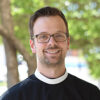Slow to Speak, Quick to Listen: Learning Christian Conversation Through Hospitality
Chris+ Myers
 As we were planning the ministry year at St. Bartholomew’s, David+ Larlee and I believed that coming into 2024, we needed some kind of space where we could not only have conversation around important but controversial topics, but also where we could learn how to have those kinds of conversations. It was not enough to have difficult conversations; we wanted to provide people with the tools to have those conversations in distinctly Christian ways.
As we were planning the ministry year at St. Bartholomew’s, David+ Larlee and I believed that coming into 2024, we needed some kind of space where we could not only have conversation around important but controversial topics, but also where we could learn how to have those kinds of conversations. It was not enough to have difficult conversations; we wanted to provide people with the tools to have those conversations in distinctly Christian ways.
So, we decided to stage five conversations over five months, using the book The Deeply Formed Life by Rich Villodas as the basis for our conversations. In the book, Villodas discusses what he calls five transformative values: contemplative rhythms, racial reconciliation, interior examination, sexual wholeness and missional presence. As we planned these evenings of conversation, our instinct was that the format of an Alpha evening would provide a structure for the kinds of conversations we imagined having around these important but sometimes difficult topics.
The first principle we took from Alpha: Begin with hospitality. We knew that every evening would begin with a shared meal. We wanted to model conversations where people were “quick to hear, slow to speak, slow to anger” (James 1:19).
The key word from James is “slow.” For things to be slow, we had to let conversation unfold over the pace of a meal.
The inherent slowness of a leisurely meal sets the pace for conversation about topics that cannot be understood at the speed of a tweet. In practical terms this meant that we reserved the patio of a local Italian restaurant so that our table groups could enjoy good food and drink as we engaged in conversation.
The second principle we took from Alpha: Establish ground rules around conversation and empower table leaders to abide by them. The first ground rule was the rule of charity. Before anyone agreed or disagreed with the chapter, it was the job of the group to summarize what we had read.
Here was the question we used to frame this ground rule: If the author were sitting at your table, would he agree that you had fairly summarized the chapter? That was the standard, and I personally believe that this was the most important ground rule for having nuanced conversation around the complex topics we discussed, like race and sexuality.
In fact, I don’t think of it as a rule at all but as an act of Christian charity. If our initial posture is one of understanding and curiosity, then we believed that this would translate into the group discussions themselves. The phrase we used to describe this is “seek to understand before being understood.” This, I believe, is the golden rule as it applies to engaging thoughtfully with others.
The second set of ground rules came straight from the training for Alpha table leaders. We told the groups to avoid frogging, bogging and hogging. Frogging occurs when people jump randomly from topic to topic and do not allow the conversation to develop naturally. Bogging occurs when one or more group members get bogged down on a single issue, whether large or small. Hogging occurs when one or more group members hog the conversation. We also added a fourth category: No flogging. In an election year especially, we felt it was important to emphasize that we not beat each other up with our ideas.
So how did this experiment go? One of the topics we covered was how to respond to the busyness of life by learning to move at a more humane, Christlike pace. As we discussed that chapter, one of my group members shared that he had listened to the audiobook version of that chapter at 2.5x speed while driving 90 mph down the highway. We all laughed in recognition of not only the irony, but also the reality of what he said. In Dallas especially, pushing against busyness sometimes feels impossible.
As the conversation continued, some argued that slowing down was a luxury they couldn’t afford, given their career, the expenses of life, the pressures of kids and activity. But as the evening progressed, we finally turned to a discussion of the practice of Sabbath. Some shared how they keep Sabbath with young children; some shared their struggles to practice Sabbath at all; and others shared their skepticism that they could ever have a day of rest. It was an honest conversation around an important but challenging topic.
This is a snapshot of the kinds of conversations that occurred over the course of five months. Each night there were certainly disagreements. Not everyone enjoyed the book. But I would say that as a basis for shared conversation around difficult topics, the book served its purpose. In fact, because of these conversations we were able to learn where our people are hungry for more teaching and conversation, so this fall we are starting another series of conversations on the theology of the body, using the book Wonderfully Made by John Kleinig.
If someone wanted to try something like this, I would suggest prayerfully considering what questions your people are asking right now. The material does matter, so selecting the right content is important; but it is even more important to create a hospitable environment where deep conversation can take place.

Chris Myers serves as the Curate of St. Bartholomew’s Anglican. He graduated from Redeemer Seminary with an M.Div. in 2013 and was ordained as a priest in the Anglican Mission in May of 2014. He recently finished his PhD in Theology from Durham University (UK), writing on the theology of Hans Urs von Balthasar. He and his wife Morgan have two delightful daughters, Eleanor and Rowan.
Category: Church Life, Spiritual Growth
Tags: conversation, discussions, hospitality










